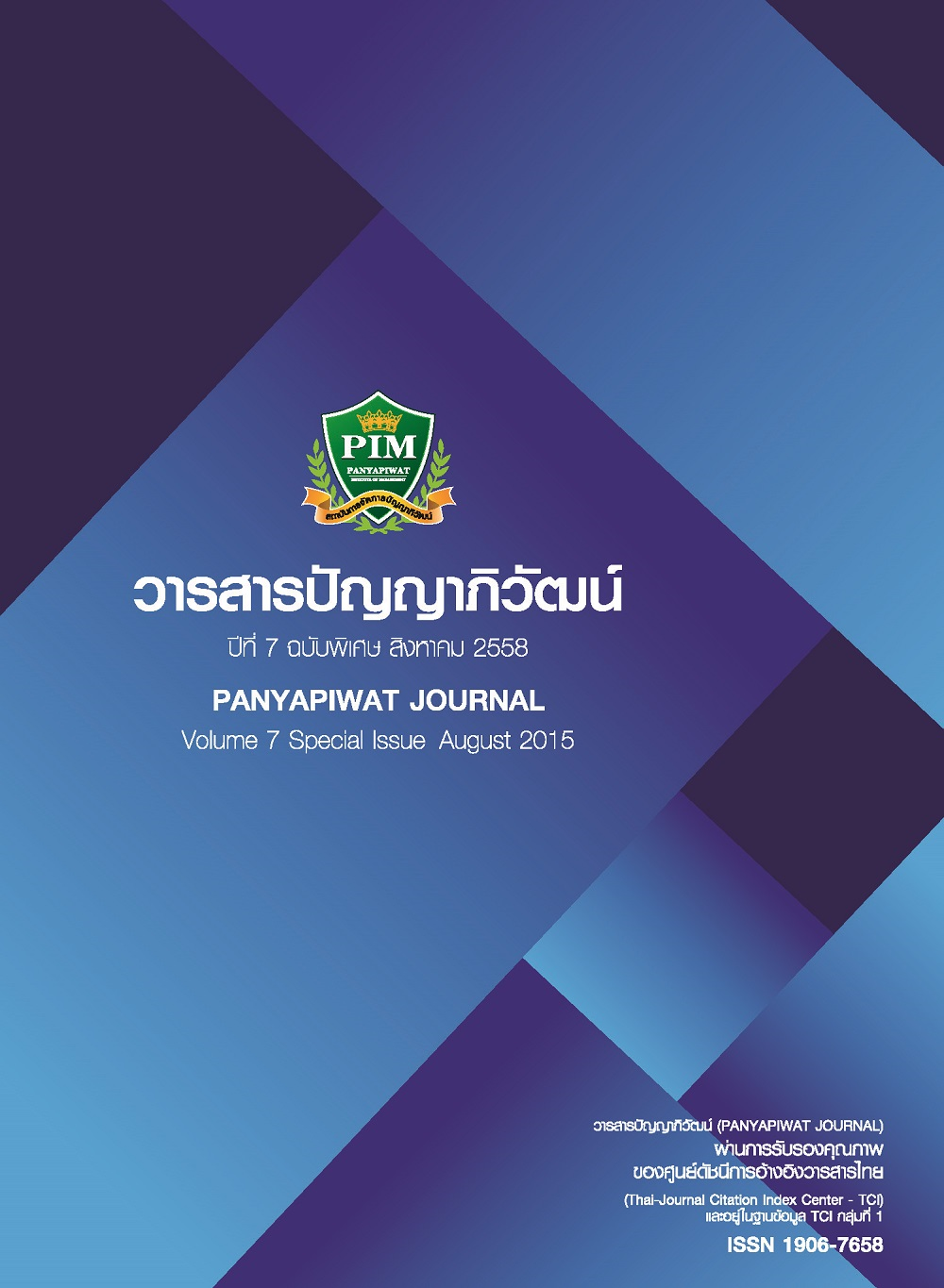อิทธิพลของการรับรู้ต่อการสนับสนุนจากองค์การและการสนับสนุนจากหัวหน้างานที่มีต่อ ความผูกพันต่อองค์การของข้าราชการทหารไทย
Main Article Content
บทคัดย่อ
การวิจัยนี้มีวัตถุประสงค์เพื่อ 1) ศึกษาระดับการรับรู้ต่อการสนับสนุนจากองค์การ การสนับสนุนจากหัวหน้างานและความผูกพันต่อองค์การของข้าราชการทหารในหน่วยงานทหารแห่งหนึ่ง 2) เปรียบเทียบการรับรู้การสนับสนุนจากองค์การ การสนับสนุนจากหัวหน้างาน และความผูกพันต่อองค์การจำแนกตามระดับชั้นยศของข้าราชการทหาร และ 3) ศึกษาอิทธิพลของการสนับสนุนจากองค์การและการสนับสนุนจากหัวหน้างาน ที่มีต่อความผูกพันต่อองค์การของข้าราชการทหารในหน่วยงานทหารแห่งหนึ่งโดยใช้แบบสอบถามในการเก็บรวบรวมข้อมูลจากกลุ่มตัวอย่างข้าราชการทหารชั้นประทวนและสัญญาบัตรของหน่วยงานทหารแห่งหนึ่ง จำนวน 176 คน ผลการวิจัย พบว่า การรับรู้ต่อการสนับสนุนขององค์การในภาพรวมอยู่ระดับปานกลาง การรับรู้ต่อการสนับสนุนจากหัวหน้างานในภาพรวมอยู่ระดับสูง และความผูกพันขององค์การทั้ง 3 ด้านอยู่ในระดับมาก ผลการวิเคราะห์ t-test และการวิเคราะห์การถดถอย พบว่า 1) นายทหารชั้นประทวนและนายทหารชั้นสัญญาบัตรมีการรับรู้ต่อการสนับสนุนจากองค์การ และการสนับสนุนจากหัวหน้างานที่แตกต่างกันอย่างมีนัยสำคัญทางสถิติที่ระดับ .01 และมีระดับความผูกพันต่อองค์การทางด้านจิตใจแตกต่างกันอย่างมีนัยสำคัญทางสถิติที่ระดับ .05 2) การรับรู้ต่อการสนับสนุนจากองค์การมีอิทธิพลต่อความผูกพันต่อองค์การทางด้านจิตใจ ด้านความจำเป็นทางสังคม และด้านบรรทัดฐานอย่างมีนัยสำคัญทางสถิติที่ระดับ .01 และ 3) การรับรู้ต่อการสนับสนันของหัวหน้างานมีอิทธิพลต่อความผูกพันต่อองค์การทางด้านจิตใจและด้านบรรทัดฐานอย่างมีนัยสำคัญทางสถิติที่ระดับ .01 และ .05 ตามลำดับ
The objectives of this research were: 1) to study levels of perceived organizational support, supervisor support, and organizational commitment of Thai military officers; 2) to compare means of perceived organizational support, supervisor support, and organizational commitment of Thai military officers according to military ranks; and 3) to study impact of perceived organizational support and supervisor support on organizational commitment of Thai military officers. Questionnaire was used to collect data from the sample size of 176 Thai military officers including non-commissioned military and commissioned military officers. Results showed that the total mean score of perceived organizational support was in moderate level while the total mean score of perceived supervisor support was in high level. For organizational commitment, the results showed “high” level for affective, continuance, and normative commitments. Independent sample t-test and regression analysis indicated that 1) there was statistically significant difference between non-commissioned and commissioned military officers on perceived organizational support and supervisor support at .01 level,and on affective commitment at .05 level; 2) perceived organizational support had statistically significant influenced on affective commitment, continuance commitment, and normative commitment at .01 level; and 3) perceived supervisor support had statistically significant influenced on affective commitment and normative commitment at .01 and .05 levels, respectively.
Article Details
“ข้าพเจ้าและผู้เขียนร่วม (ถ้ามี) ขอรับรองว่า บทความที่เสนอมานี้ยังไม่เคยได้รับการตีพิมพ์และไม่ได้อยู่ระหว่างกระบวนการพิจารณาลงตีพิมพ์ในวารสารหรือแหล่งเผยแพร่อื่นใด ข้าพเจ้าและผู้เขียนร่วมยอมรับหลักเกณฑ์การพิจารณาต้นฉบับ ทั้งยินยอมให้กองบรรณาธิการมีสิทธิ์พิจารณาและตรวจแก้ต้นฉบับได้ตามที่เห็นสมควร พร้อมนี้ขอมอบลิขสิทธิ์บทความที่ได้รับการตีพิมพ์ให้แก่สถาบันการจัดการปัญญาภิวัฒน์หากมีการฟ้องร้องเรื่องการละเมิดลิขสิทธิ์เกี่ยวกับภาพ กราฟ ข้อความส่วนใดส่วนหนึ่งและ/หรือข้อคิดเห็นที่ปรากฏในบทความข้าพเจ้าและผู้เขียนร่วมยินยอมรับผิดชอบแต่เพียงฝ่ายเดียว”
References
ธิติวัฒน์ แจ่มศักดิ์. (2548). ปัจจัยที่มีความสัมพันธ์กับความผูกพันต่อองค์การของข้าราชการศูนย์การอุตสาหกรรมป้องกันประเทศและพลังงาน. สืบค้นเมื่อ 20 กรกฎาคม 2557, จาก http://tea.gspa-buu.net/library/is/mpa47/47933158.pdf
ธีรวุฒิ เอกะกุล. (2543). ระเบียบวิธีวิจัยทางพฤติกรรมศาสตร์และสังคมศาสตร์. อุบลราชธานี: สถาบันราชภัฏอุบลราชธานี.
ธรรมรัตน์ อยู่พรต. (2556). การรับรู้การสนับสนุนจากองค์กรและการรับรู้การสนับสนุนจากหัวหน้างานที่ส่งผลต่อพฤติกรรมการเป็นสมาชิกที่ดีขององค์กรของเจนเนอเรชั่นต่างๆ. วารสารปัญญาภิวัฒน์, 4(2), 24-39.
ปัทมา สมสนั่น. (2556). การศึกษาความผูกพันต่อองค์การของข้าราชการทหารกองทัพบก. วารสารการตลาดและการสื่อสาร, 1(2), 775-796.
สุมินทร เบ้าธรรม. (2554). การรับรู้ถึงการได้รับการสนับสนุนจากองค์กร ความพึงพอใจในการทำงาน ความผูกพันต่อองค์กร และความตั้งใจที่จะลาออกจากงานโดยสมัครใจของบุคลากรในสังกัดมหาวิทยาลัยเทคโนโลยีราชมงคลอีสาน และมหาวิทยาลัยเทคโนโลยีราชมงคลธัญบุรี. วารสาร มทร. อีสาน, 4(1), 37-55.
Armstrong-Stassen, M. (1998). The effect of gender and organizational level on how survivors appraise and cope with organizational downsizing. Journal of Applied Behavioral Science, 34(2), 125-142.
Aube, C. V., Rousseau, V. & Morin, E. M. (2007). Perceived organization support and organizational commitment. The moderating effect of locus of control and work autonomy. Journal of Managerial Psychology, 22(5), 479-495.
Daft, R. L. (2011). New era of management. (10th ed.). South-Western, Cengage Learning: International Edition.
Darolia, C. R., Kumari, P. & Dorolia, S. (2010). Perceived organizational support, work motivation, and organizational commitment as determinants of job performance. Journal of the Indian Academy of Applied Psychology, 36(1), 69-78.
Eisenberger, R., Huntington, R., Hutchison, S. & Sowa, D. (1986). Perceived organizational support. Journal of Applied Psychology, 7(3), 500-507.
Eisenberger, R., Armeli, S., Rexwinkel, B., Lynch, P. D. & Rhoades, L. (2001). Reciprocation of perceived organizational support. Journal of Applied Psychology, 86(1), 42-51.
Eisenberger, R., Stinglhamber, F., Vandenberghe, C., Sucharski, I. & Rhodes, L. (2002). Perceived supervisor support: contributions to perceived organizational support and employee retention. Journal of Applied Psychology, 87(3), 565-573.
Kazluaskaite, R., Buciuniene, I. & Turauskas, L. (2006). Building employees commitment in the hospitality industry. Baltic Journal of Management, 1(3), 300-314.
Latif, S. & Gulzar, A. (2012). The impact of organizational and supervisory support on survivors’ organizational commitment after downsizing in telecom sector of Pakistan. International Journal of Economics and Management Science, 1(5), 55-61.
Latif, K. I. & Sher, M. (2012). Perceived organizational support, pay satisfaction, and supervision satisfaction impact on career satisfaction. Abasyn Journal of Social Science, 5(1), 32-48.
Meyer, J. P. & Allen, N. J. (1991). A three-component conceptualization of organizational commitment.Human Resource Management Review, 1(1), 61-89.
Nunnally, J. C. (1978). Psychometric theory. New York: McGraw-Hill.
O’ Driscoll, M. P. & Randall, D. M. (1999). Perceived organizational support, satisfaction with rewards, employees job involvement and organizational commitment. Applied Psychology: An International Review, 48(2), 197-209.
Phillips, J. M. & Gully, S. M. (2012). Organizational behavior: tool for success. South-Western: Cengage Learning.
Robbins, S. P. & Judge, T. A. (2013). Organizational Behavior. (15th ed.). Global Edition: Pearson Education, Inc.
UCAR, D. & OTKEN, A. B. (2010). Perceived organizational support and organizational commitment: the mediating role of organization based self-esteem. Retrieved June 10, 2014, from http://iibf.deu.edu.tr/deuj/index.php/cilt1-sayi1/article/viewFile/277/pdf_257
Translated Thai References
Baotham, S. (2011). Perceived organizational support, job satisfaction, organizational commitment and voluntary turnover intention of Thai employees in Rajamangala University of Technology Isan and Rajamangala University of Technology Thanyaburi. RMUTI Journal, 4(1), 33-55. [in Thai]
Jamsak, T. (2005). Correlated factors of organizational commitment of officers’ Defence Industry and Energy Centre. Retrieved July 20, 2014, from http://tea.gspa-buu.net/library/is/mpa47/47933158.pdf [in Thai]
Somsanan, P. (2013). A study of organization commitment of Royal Thai Army’s officers. Journal of Marketing and Communication, 1(2), 775-796. [in Thai]
Yuprot, T. (2013). Effects of perceived organizational support and perceived supervisor support on organizational citizenship behaviors among the generation. Panyapiwat Journal, 4(2), 24-39. [in Thai]

